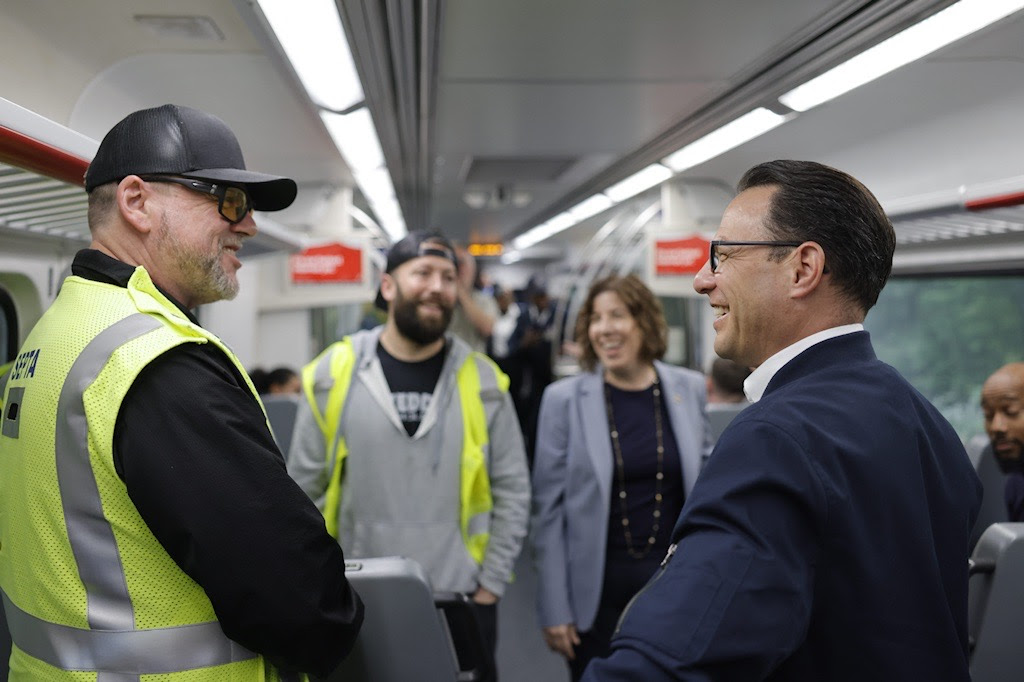Gov. Josh Shapiro brought his budget-promoting roadshow to the Delaware Valley Thursday, talking up increased spending on mass transit. What he didn’t discuss is the growing gap between rising costs and declining ridership.
The Democratic governor has been going around the state drumming up support for his $48.3 billion proposed 2024-25 budget.
On Thursday, Shapiro jumped on the SEPTA train at Rydal Station in Abington and rode to Langhorne Station in Bucks County to focus attention on his call for $282.8 million in additional spending on public transit. He was joined by PennDOT Secretary Mike Carroll, SEPTA CEO Leslie Richards, and Transit Police Chief Charles Lawson, along with local legislators.
Shapiro argues millions of state residents take public transit to work, school, or travel. He says public transit availability also helps employers recruit workers, connect with clients, and makes the state economically competitive.
Shapiro’s budget would increase the state share of public transit funding by 1.75 percent, adding up to nearly $1.5 billion in new taxpayer dollars over five years.
Critics believe SEPTA already gets its fair share of state funding.
“Gov. Shapiro is proposing a mass transit bailout forcing taxpayers across the state to further subsidize a transportation system they will never use. Polling shows only 35 percent of voters support the bailout. And Pennsylvania drivers already send more than $600 million to mass transit systems,” said Elizabeth Stelle, director of policy analysis at the Commonwealth Foundation.
“Funneling more funds from Harrisburg to SEPTA won’t save the system that’s seen a rapid decline in ridership. It’s time for SEPTA to find cost savings and increase its reliance on fares—not state taxpayers,” Stelle said.
A Commonwealth Foundation analysis found SEPTA and Pittsburgh Regional Transit (PRT) have lost riders since 2019. SEPTA lost 39 percent of its riders, and PRT lost 32 percent. The Norristown High Speed Line lost 50 percent of its passengers.
In October 2023, average ridership was just 67 percent of the October 2019 number. On Regional Rail, ridership was just 56 percent of the pre-COVID average.
Former riders cite crime as a reason they no longer ride SEPTA. Since 2019, crime and quality of life violations on SEPTA vehicles and stations increased significantly. Robberies and aggravated assaults on SEPTA increased by more than 80 percent between 2019 and 2021 despite ridership decreasing by 50 percent during that time period.
Quality of life violations on SEPTA increased by 34 percent from 2019 to 2022. Certain offenses, such as littering, disorderly conduct, public urination, and smoking, increased by more than 200 percent from 2019 to 2022.
Shapiro addressed those concerns on Thursday.
“My budget includes an additional $161 million to help keep SEPTA clean and safe, and if the General Assembly passes it, SEPTA will be able to fund 40 more police officers, 30 more safety personnel, and 100 more cleaners without cutting service or raising fares. This is a commonsense investment that will help provide real freedom and opportunity for more than 700,000 Pennsylvanians who use SEPTA every day,” Shapiro said.
He argues that public transit is critical in Southeastern Pennsylvania, where it serves the five-county area. In addition to SEPTA, the governor’s proposal would fund 31 other public transit systems across the state.
Ahead of his budget address in February, the governor and his administration worked closely with SEPTA to assess its needs and develop a plan to address riders’ concerns about cleanliness and safety on the system. Richards thanked Shapiro for his “historic investment” into public transportation.
However, in 2017, SEPTA invested in new double-decker train cars from a Chinese company, spending more than $50 million. The Inquirer reported that the transit agency canceled the order in April over “shoddy work.” The transit agency said it would try to recover that money.
Richards and Shapiro, both Democrats, served as Montgomery County commissioners, elected together in 2011.
In April, SEPTA proposed a $2.6 billion total budget for Fiscal Year 2025 that includes twice the funding for safety and cleanliness programs, including a total of $72 million to fund 40 more police officers, 30 more safety professionals, and 100 more cleaners.
Despite lower ridership, SEPTA’s operating budget has increased by 9.3 percent since 2019. The agency reports a $240 million budget shortfall and has threatened 30 percent fare increases and 20 percent service cuts to offset the shortfall.
“When it comes to spending more money on SEPTA, I will echo the words of [Philadelphia] Mayor Parker: ‘People will not return to SEPTA if they don’t feel safe,’” said House Republican Appropriations Chairman Seth Grove (R-York). “Ridership has dropped 39 percent from 2018-2019 levels. Before approving more state money to a public transit system that hasn’t returned to pre-pandemic levels, we need to see a comprehensive plan to reform the system.”
But DelVal legislators in both parties praised Shapiro’s visit.
“I appreciate the opportunity of having Gov. Shapiro in our district to discuss the important issue of transit funding,” said Sen. Frank Farry (R-Bucks). “Transit plays an important role in the 6th Senatorial District for our citizens, students, and workforce. I look forward to continuing the discussion on adequate funding for our transit agencies.”
“SEPTA is an important part of the Philadelphia area’s transportation infrastructure,” said Rep. Joe Hogan (R-Penndel). “With headline events like the 2026 FIFA World Cup, America250, and the 2026 MLB All-Star game coming to Philadelphia, this investment is necessary to make sure SEPTA is prepared for the crowds that will come with them.”
“Folks who are struggling to make it across Pennsylvania told me that lack of transportation is a key barrier to getting ahead,” said Sen. Art Haywood (D-Montgomery). “Transportation equals pay. We cannot afford to delay Gov. Shapiro’s plan.”
Please follow DVJournal on social media: Twitter@DVJournal or Facebook.com/DelawareValleyJournal

